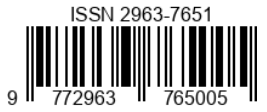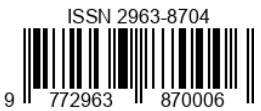Kebijakan Penerapan Tindak Pidana Penistaan Agama Di Indonesia
DOI:
https://doi.org/10.55606/jhpis.v2i2.1642Keywords:
religious blasphemy, CrimeAbstract
Ethnicity, religion, race and intergroup (SARA) are social elements that have an important role in human life, therefore, the freedom of each party must be respected and guaranteed. Religion is an important element of human existence and perhaps the most impressive element that can exert an important influence on the behavior of individuals. Indonesian positive law regulates punishment for perpetrators of religious blasphemy regulated in Article 156a of the Criminal Code. The initial purpose of enacting this article was against the backdrop of the many sects of belief and mysticism teachings that were considered heretical and not in accordance with the religious teachings of the Indonesian people. Article 156a of the Criminal Code is intended to prevent religious teachings from being distorted which are considered as the main teachings by the leaders or religious leaders concerned; and this rule protects religious peace in society and maintains the values of religious teachings that are maintained by the community from insults/humiliations and from teachings not to embrace a religion based on Belief in the One Supreme God.
Downloads
References
Andi Hamzah, Delik–Delik Tertentu (Speciale Delicten) di dalam KUHP, Sinar Grafika, Jakarta, 2015
Budi Suhariyanto, Tindak Pidana Teknologi Informasi (Cybercrime): Urgensi Pengaturan dan Celah Hukumnya, Rajawali Pers, Jakarta, 2013
Hijrah Adhyanti Mirzana, “Kebijakan Kriminalisasi Delik Penodaan Agama”, Jurnal Pendecta, Volume VII, No. 2
https://www.suarasurabaya.net/kelanakota/2022/penendang-sesajen-di-semeru-resmi-tersangka/
http://www.hukumonline.com/klinik/detail/lt4fb9207fl726f/pasal-untuk-menjerat-penyebar- kebencian-sara-di-jejaring-sosial, diakses, tanggal
Johny Ibrahim,Teori dan Metodologi Penelitian Hukum Normatif, (Malang: Bayu Publlishing, 2006)
Jur Andi Hamzah, Delik – Delik Tertentu (Speciale Delicten) Di Dalam KUHP, Sinar Grafika, Jakarta, 2015
Muhammad Dahri, Tindak Pidana Penodaan Agama Di Indonesia: Tinjauan Pengaturan Perundang-Undangan dan Konsep Hukum Islam, AT-TAFAHUM: Journal of Islamic Law, Vol. 1 No. 2 Juli-Desember 2017
M. Solehuddin, Sistem Sanksi dalam Hukum Pidana, Raja Grafindo Persada, Jakarta, 2003
Randy Adare, “Delik Penodaan Agama Di Tinjau Dari Sudut Pandang Hukum Pidana Di Indonesia” (2013) 1:1 Lex Et Societatis
Marsudi Utoyo, Tindak Pidana Penistaan Agama Oleh Kelompok Aliran Di Indonesia Pranata Hukum, Jurnal Hukum, Volume 7 Nomor 1 Januari 2012
Siswanto Sunarso, Hukum Informasi dan Transaksi Elektronik, Rineka Cipta, Jakarta, 2009
Downloads
Published
How to Cite
Issue
Section
License
Copyright (c) 2023 JURNAL HUKUM, POLITIK DAN ILMU SOSIAL

This work is licensed under a Creative Commons Attribution-ShareAlike 4.0 International License.

















